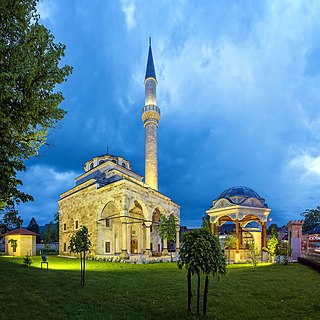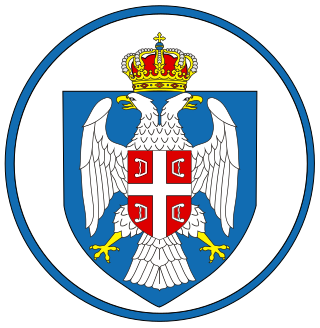
Ethnic cleansing is the systematic forced removal of ethnic, racial, or religious groups from a given area, with the intent of making the society ethnically homogeneous. Along with direct removal such as deportation or population transfer, it also includes indirect methods aimed at forced migration by coercing the victim group to flee and preventing its return, such as murder, rape, and property destruction. Both the definition and charge of ethnic cleansing is often disputed, with some researchers including and others excluding coercive assimilation or mass killings as a means of depopulating an area of a particular group.
Ethnic violence is a form of political violence which is expressly motivated by ethnic hatred and ethnic conflict. Forms of ethnic violence which can be argued to have the characteristics of terrorism may be known as ethnic terrorism or ethnically motivated terrorism. "Racist terrorism" is a form of ethnic violence which is dominated by overt racism and xenophobic reactionism.

The Serb Volunteer Guard was a Serbian volunteer paramilitary unit founded and led by Željko Ražnatović. It fought in the Croatian War and the Bosnian War during the Yugoslav Wars, and was responsible for numerous war crimes and massacres.

Ferhat Pasha Mosque, also known as the Ferhadija Mosque, is a mosque in the city of Banja Luka and one of the greatest achievements of Bosnia and Herzegovina's 16th century Ottoman Islamic architecture. The mosque was demolished in 1993 at the order of the authorities of Republika Srpska as a part of an ethnic cleansing campaign, and was rebuilt and opened on 7 May 2016.

The Bosnian genocide took place during the Bosnian War of 1992–1995 and included both the Srebrenica massacre and the wider crimes against humanity and ethnic cleansing campaign perpetrated throughout areas controlled by the Army of Republika Srpska (VRS). The events in Srebrenica in 1995 included the killing of more than 8000 Bosniak men and boys, as well as the mass expulsion of another 25000–30000 Bosniak civilians by VRS units under the command of General Ratko Mladić.

The ethnic cleansing of Georgians in Abkhazia, also known in Georgia as the genocide of Georgians in Abkhazia, refers to the ethnic cleansing, massacres, and forced mass expulsion of thousands of ethnic Georgians living in Abkhazia during the Georgian-Abkhaz conflict of 1992–1993 and 1998 at the hands of Abkhaz separatists and their allies. Armenians, Greeks, Russians, and opposing Abkhazians were also killed.

The White Eagles, also known as the Avengers, were a Serbian paramilitary group associated with the Serbian National Renewal (SNO) and the Serbian Radical Party (SRS). The White Eagles fought in Croatia and Bosnia and Herzegovina during the Yugoslav Wars.
The expulsion of non-resident Tamils from Colombo was an incident which took place on June 7, 2007 when 376 ethnic Tamil refugees living in Colombo were deported from the city by the Sri Lankan Police. The evicted were sent back to Jaffna, Vavuniya, Trincomalee and Batticaloa, where they are originally from, in several buses with a police escort. However the buses only went as far as the town of Vavuniya and the evicted Tamils were forced to stay in a detention camp. The President asked those who were evicted to come back to Colombo and ordered an investigation into the incident
Master Plan, Masterplan or The Master Plan may refer to:
Ethnic Cleansing is a 2002 first-person shooter produced by the National Alliance, an American white supremacist and neo-Nazi organization. The player controls one of three selectable characters, including a Ku Klux Klan member and a neo-Nazi skinhead, and traverses two levels to kill stereotypically depicted African Americans, Latinos, and Jews. Designed to be politically incorrect and spread a white supremacy message, the game was released through the National Alliance's record label, Resistance Records, on Martin Luther King Jr. Day 2002. It was received negatively by anti-hate organizations like the Anti-Defamation League of B'nai B'rith and has been considered as one of the most controversial and most racist games. Resistance Records sought to release a series of games based on the novel The Turner Diaries and published White Law in 2003.
Social cleansing is social group-based killing that consists of the elimination of members of society who are considered "undesirable", including, but not limited to, the homeless, criminals, street children, the elderly, the poor, the weak, the sick, the needy and the disabled. This phenomenon is caused by a combination of economic and social factors, but killings are notably present in regions with high levels of poverty and disparities of wealth. Perpetrators are usually of the same community as the victims and they are often motivated by the idea that the victims are a drain on the resources of society. Efforts by national and local governments to stop these killings have been largely ineffective. The government and police forces are often involved in the killings, especially in Africa, Asia, and South America.

Ethnic cleansing of Georgians in South Ossetia was a mass expulsion of ethnic Georgians conducted in South Ossetia and other territories occupied by Russian and South Ossetian forces, which happened during and after the 2008 Russia–Georgia war. Overall, at least 20,000 Georgians were forcibly displaced from South Ossetia.
The Expulsion may refer to:
The Cleansing may refer to:

Ethnic cleansing occurred during the Bosnian War (1992–95) as large numbers of Bosnian Muslims (Bosniaks) and Bosnian Croats were forced to flee their homes or were expelled by the Army of Republika Srpska and Serb paramilitaries. Bosniaks and Bosnian Serbs had also been forced to flee or were expelled by Bosnian Croat forces, though on a restricted scale and in lesser numbers. The UN Security Council Final Report (1994) states while Bosniaks also engaged in "grave breaches of the Geneva Conventions and other violations of international humanitarian law", they "have not engaged in "systematic ethnic cleansing"". According to the report, "there is no factual basis for arguing that there is a 'moral equivalence' between the warring factions".

The Ethnic Cleansing of Palestine is a book authored by New Historian Ilan Pappé and published in 2006 by Oneworld Publications. The book is about the 1948 Palestinian expulsion and flight, which Pappe argues was the result of ethnic cleansing.

The Nakba is the ethnic cleansing of Palestinian Arabs through their violent displacement and dispossession of land, property, and belongings, along with the destruction of their society and the suppression of their culture, identity, political rights, and national aspirations. The term is used to describe the events of the 1948 Palestine war in Mandatory Palestine as well as the ongoing persecution and displacement of Palestinians by Israel. As a whole, it covers the fracturing of Palestinian society and the long-running rejection of the right of return for Palestinian refugees and their descendants.
Ethnic cleansing in Kosovo may refer to numerous different events:









